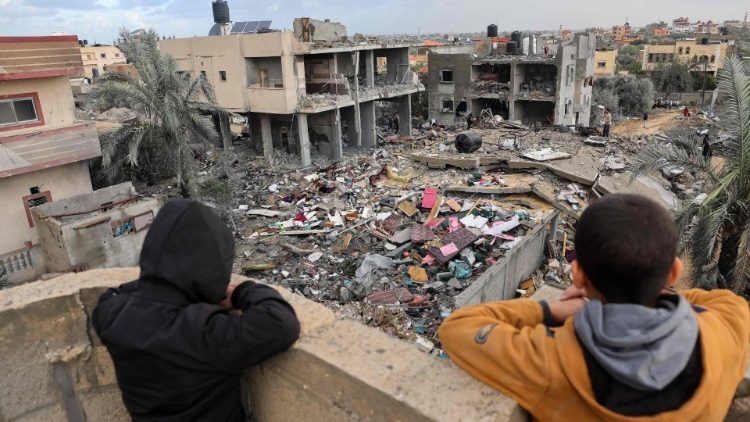We mark World Children’s Day on 20 November as heavy fighting continues to kill, injure and displace tens of thousands of Palestinian children inside the Gaza Strip.
The families of some 30 Israeli children abducted by Hamas militants on 7 October meanwhile, continue to pray for their safety and await their release.
As James Denselow, the Head of Conflict and Humanitarian Policy and Advocacy for Save the Children UK, told Vatican Radio, children are paying the highest price in the ongoing Israeli-Hamas war, and those who survive will carry the scars of violence for years to come.
“I think it’s important on International Children’s Day to really understand the impact that this conflict has had, particularly on children, that the biggest impacts have fallen on those with the smallest shoulders,” James Denselow says.
He describes that impact on a population of over a million children in Gaza – one of the most densely populated parts of the world – like a pyramid: “At the top of the pyramid, the greatest tragedy is reserved for those who’ve lost their lives.”
Noting that the number is an estimate because of the collapsing casualty recording that has occurred over the last few weeks, Denselow said at least 5,000 children have been killed or are missing under the rubble in Gaza.
“So that is obviously the most visible and tragic part of the story for children,” he said.
Then, he continued, a far larger number beneath them in the pyramid is those children who have been wounded.
“And these are often serious injuries, life-changing injuries, loss of limbs, loss of body function, injuries they will have to spend the rest of their lives with if they survive this conflict,” he added.
And then below them, he continued, there is a larger number relative to those who have been forced from their homes, who are living in a state of displacement, “often in shelters that are completely unsuitable for children, especially young children, as water and food is difficult to secure.”
The Save the Children expert also highlighted the fact that even prior to this conflict, it was estimated that four out of five children in Gaza were already showing signs of depression.
“So it’s a very vulnerable population that has now endured an incredibly intense period of conflict,” he said, “and that is why we, and many agencies, are so desperate to call for a humanitarian ceasefire.”
Difficulty in providing aid
The rights of these children are clearly not a priority for the warring parties, so asked what can be done to help in this situation, Denselow lamented that it is “far, far too little compared to what the need is.”
He pointed out that Gaza is the most dangerous place to be an aid worker, noting that so far, the UN has already lost over 100 members of its team.
“Our team on the ground in Gaza are not able to operate as they would choose, as they would like to, because the vast majority of them have been forced from their homes and they’re prioritizing looking after their own safety and their family’s safety,” he explained.
Denselow also underscored the impossibility of conducting an aid operation due to the closure of the Strip and the fact that the aid that manages to trickle in is “a drop in the ocean when it comes to the numbers of trucks that are crossing, the materials that they are carrying.”
On top of that, he said, “You have the cutting off of water, of sustained water supplies, of fuel and of electricity. So it is a time of huge suffering.”
What’s more, he observed, winter is on its way in Gaza with heavy rains that make life even harder.
Evacuation of premature babies
The only positive story, Denselow said in this “context of such darkness is the fact that a large number of the premature babies who were surviving through a neonatal unit in the central hospital of Shifa have successfully been evacuated into Egypt, where hopefully they will find a place of greater safety. Unfortunately, not all of these premature babies made it, and I think that should really shame us all.”
Families choosing to survive or die together
Denselow said the stories he is hearing from the Save the Children and other teams in Gaza are heartbreaking.
“Families are making very difficult choices about what they should do in a place of no safety at all,” he recounted, “Often you hear stories of families choosing to stay together so that they can live or die together, which again, is a sign about how desperate things are.”
“And of course,” he said, “we’ve heard from the hospitals and guards about the large number of children who are coming in injured without any surviving relatives.”
James Denselow noted that in other contexts, the job his organization would carry out would be to enforce child protection and make sure that children are not isolated or separated from family and caregivers.
But, he said, because of the nature of the violence in this territory it is impossible to do that.
Call for release of abducted Israeli children
The other aspect we shouldn’t forget, Denselow pointed out, regards “the Israeli children in the midst of this who are being held hostage in Gaza, and we would call for them to be immediately released.”
“They should have been released or should never have been taken. It’s a grave violation to abduct children,” he said.
The Head of Conflict and Humanitarian Policy also recalled the plight of many children in southern Israel who have been forced from their homes due to the nature of the fighting.
“Too often this conflict is seen as very politicized and very much choosing a side,” he said, “but I would ask everyone to choose children”






